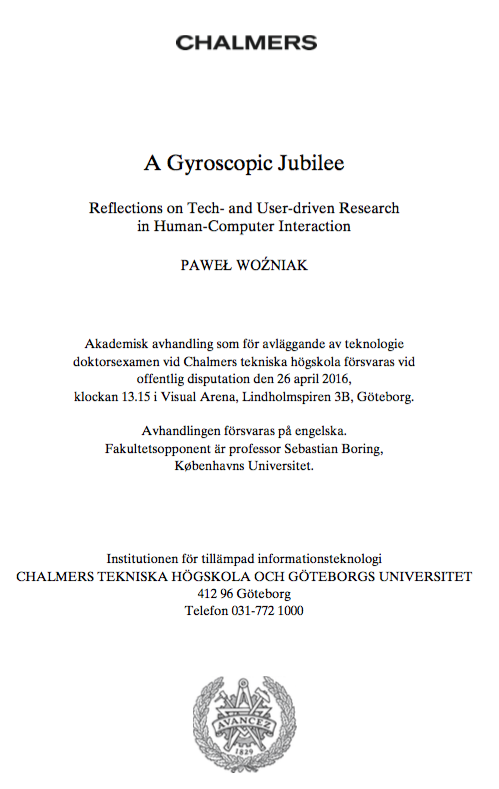Dissertation information
This webpage has all the current information about my doctoral thesis and its defense. Please not that the version available here is still preliminary.
A Gyroscopic Jubilee: Reflections on Tech- and User-driven Research in Human-Computer Interaction
Paweł Woźniak
Abstract:
This cumulative thesis presents a reflective retrospective of my work in the field of Human-Computer Interaction (HCI). In order to gain deeper insights into the various types of work presented here, I introduce design-based research as the theoretical framing. I then discuss different kinds of contributions that design-based research can generate to re-evaluate the papers included in this thesis. The content is organised in two contrasting themes — technology- and user-driven inquiry that aid the reflective analysis.
I conducted a literature survey of how design-based research was addressed in the HCI community as well as works on understanding the role of design in HCI research. Based on the review, I propose the Contribution Type Family (CTF) model to relate the types of contribution from the different sources.
The next part of the work investigates multi-device interactions in mobile setting and shows an evolution of a vision into concrete prototype system designs. I discuss possibilities for multi-device systems to support data exploration and sensemaking. I also outline a vision of future computational environments where multiple mobile devices enable enhanced civic discussion. This research shows an example of tech-driven inquiry where researchers try to find meaningful use and interaction patterns for future technology.
An interlude is included in the thesis that discusses experiences from practical work in the industry. I discuss the role of buzzwords and possible positive influence they may produce. I then show an example of how a buzzword-driven design case was successfully conducted in a user-centred manner within the field of commercial vehicle telematics.
The third segment in this thesis addresses user-driven inquiry in the domain of designing engaging interactive systems for amateur athletes. I provide an example of an extensive study into the needs of advanced amateur runners and then show how these insights can be applied to build a device for remote runner support. I also show how studying non-expert users who design gamification systems for athletic performance can lead to new insights into building gamified systems for sports motivation.
Next, I use the proposed CTF model to show the differences between the works included in this thesis and reinterpret their contributions. I conclude this thesis with remarks on the inherent differences between tech- and user-driven inquiries, which are presented in the form of seven lessons learnt that are aimed to inspire and inform future research.
This is the link to the current draft of the thesis. Please bear in mind that there are pending modifications (including new references for the literature review) and the thesis will be constantly updated until 21/3.
**Papers included in the thesis:
**
- Morten Fjeld, Paweł Woźniak, Josh Cowls, and Bonnie Nardi. 2015. Ad hoc encounters with big data: Engaging citizens in conversations around tabletops. First Monday 20, 2.
- Paweł Woźniak, Benjamin Schmidt, Lars Lischke, Zlatko Franjcic, Asim Evren Yantaç, and Morten Fjeld. 2014. MochaTop: building ad-hoc data spaces with multiple devices. CHI’14 Extended Abstracts on Human Factors in Computing Systems, 2329-2334.
- Paweł Woźniak, Lars Lischke, Benjamin Schmidt, Shengdong Zhao, and Morten Fjeld. 2014. Thaddeus: A Dual Device Interaction Space for Exploring Information Visualisation. Proceedings of the 8th Nordic Conference on Human-Computer Interaction: Fun, Fast, Foundational, ACM, 4-50.
- Paweł Woźniak, Nitesh Goyal, Przemysław Kucharski, Lars Lischke, Sven Mayer, and Morten Fjeld. 2016. RAMPARTS: Supporting Sensemaking with Spatially-Aware Mobile Interactions. Accepted for publication in the 34th Annual ACM Conference on Human Factors in Computing Systems – CHI ’16.
- Paweł Woźniak, Robert Valton, and Morten Fjeld. 2015. Volvo Single View of Vehicle: Building a Big Data Service from Scratch in the Automotive Industry. Proceedings of the 33rd Annual ACM Conference Extended Abstracts son Human Factors in Computing Systems — CHI EA 15, ACM Press, 671-678.
- Kristina Knaving, Paweł Woźniak, Morten Fjeld, and Staffan Björk. 2015. Flow is Not Enough: Understanding the Needs of Advanced Amateur Runners to Design Motivation Technology. Proceedings of the 33rd Annual ACM Conference on Human Factors in Computing Systems — CHI 15, ACM Press, 2013-2022.
- Paweł Woźniak, Kristina Knaving, Staffan Björk, and Morten Fjeld. 2015. RUFUS: Remote Supporter Feedback for Long-Distance Runners. Proceedings of the 17th International Conference on Human-Computer Interaction with Mobile Devices and Services, 115-124
- Kristina Knaving, Paweł Woźniak, Morten Fjeld, and Staffan Björk. 2016. The Boar Board: Understanding Grassroots Sports Gamification in the Wild. Currently in review.
Some videos showcasing the research
